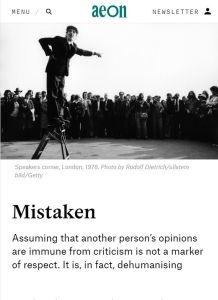
Daniel Ward
Mistaken
I Think, Therefore I Make Mistakes and Change my Mind
Aeon, 2018
What's inside?
Everyone makes mistakes, so why do economics and sociology treat people’s preferences as a special exception?
Recommendation
Ever since English poet Alexander Pope wrote the famous line, “To err is human,” people have linked humanity to the ability to make mistakes. And yet, this realization doesn’t always extend to people’s personal preferences, which sciences such as economics and sociology tend to treat as given or even too sacred to criticize. Lawyer Daniel Ward deconstructs the origins of what he calls “general infallibility” and calls for more critical thinking. Ward’s analysis meanders a bit and is more than a light read, but if you work in a diverse environment, you will appreciate his premise that criticizing – even judging – the opinions of others means giving those opinions the respect they deserve.
Take-Aways
- People who believe in “general infallibility” think no one has the right to judge anybody else for their opinions in certain contexts.
- General infallibility may have roots in sociologists’ belief in cultural relativism and economists’ theory of revealed preference.
- The capacity to reason makes people more susceptible to error.
Summary
People who believe in “general infallibility” think no one has the right to judge anybody else for their opinions in certain contexts.
The concept of general infallibility finds its roots in modern liberalism, sociology and economics. While no one doubts that people can make mistakes in tasks like predicting the weather or offering medical recommendations, people often don’t extend that capacity for error to other people’s preferences.
“Assuming that another person’s opinions are immune from criticism is not a marker of respect. It is, in fact, dehumanizing.”
Many consider people’s tastes and opinions immune to scrutinization. However, this worldview shuts down rational discussion. People’s errors in judgment show that they’re thinking human beings.
General infallibility may have roots in sociologists’ belief in cultural relativism and economists’ theory of revealed preference.
When studying other cultures, anthropologists need to combat ethnocentrism and avoid thrusting their own values on a different culture. However, 20th-century anthropologist Ruth Benedict was one who continued to insist that morality was relative. “Mankind has always preferred to say, ‘It is morally good,’ rather than ‘It is habitual’,” she said in 1934, “but historically, the two phrases are synonymous.”
“Only by recognizing that people are capable of error can we properly value anyone’s goals or engage in rational debate.”
However, if no one should question a society’s moral system – because that society can’t err in deciding what’s right for itself – the next logical step is to assume that individual people deserve the same freedom to decide what’s right for themselves as individuals. Such relativism is false. The fact that people do change their minds and can be persuaded shows that beliefs aren’t implacable.
“We are capable of making mistakes precisely because we are thoughtful, intelligent beings with complex goals and sincerely held values.”
General infallibility also developed out of economists’ concept of preferences. Economists like Paul Samuelson have asserted that people reveal what they truly want through what they buy. Those revealed preferences can them help guide economists in predicting what will happen when prices fluctuate or financial policies change. Much like the extreme end of cultural relativism, the theory relies on the assumption that people’s preferences are irreproachable. Yet, revealed preference fails to account for consumers who regret their purchases. If people feel afterward that they’ve made a wrong choice, then their purchase didn’t reveal their true preference.
The capacity to reason makes people more susceptible to error.
Humans aren’t mere slaves to their impulses. They sometimes make mistakes in pursuing their goals, and sometimes the goals themselves deserve scrutiny. People shouldn’t treat other people’s preferences as unbendable facets of their owners’ identities. It’s not disrespectful to try to persuade others. Engaging critically with others’ views is a crucial part of any debate.
About the Author
Attorney Daniel Ward focuses on commercial litigation and international arbitration. He is a PhD candidate in legal studies at the University of Cambridge, England.
This document is restricted to personal use only.
My Highlights
Did you like this summary?
Read the articleThis summary has been shared with you by getAbstract.
We find, rate and summarize relevant knowledge to help people make better decisions in business and in their private lives.
Already a customer? Log in here.
















Comment on this summary